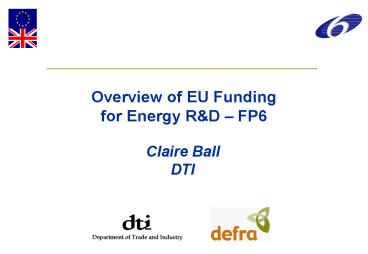Overview of EU Funding for Energy R - PowerPoint PPT Presentation
1 / 18
Title:
Overview of EU Funding for Energy R
Description:
Hydrogen/fuel cells. Weaknesses. Renewable supply. Renewables integration. Grid issues ... Hydrogen and fuel cells. Renewable electricity generation. Renewable ... – PowerPoint PPT presentation
Number of Views:52
Avg rating:3.0/5.0
Title: Overview of EU Funding for Energy R
1
Overview of EU Funding for Energy RD FP6
- Claire Ball
- DTI
2
Overview of EU Funding for Energy RD FP6
- Brief history of energy funding in the Framework
Programmes - Overview and results from FP6
- FP requirements
- Achieving success in the FP
- Support to projects
- Look ahead to FP7
3
Total Framework Programme (FP) Budgets M
4
Non-nuclear Energy Budgets M
5
Sustainable Energy Systems in FP6
- Short-medium term - DG TREN
- Mostly demonstration dissemination shorter
term research - Renewables
- Energy efficiency/savings technologies
- Medium-long term - DG Research
- Mostly research integrated activities
- Cost competitiveness of new and renewable energy
sources, energy carriers and energy technologies
6
Results - Energy in FP6
- Overall success rate was 1 in 4.2
- There were 271 successful proposals
- 8.5 of successful proposals had a UK
co-ordinator (23 proposals) - 47 of successful proposals had a UK participant
7
Results - Energy in FP6
- 860M was allocated to successful proposals
- 11.5 of the funding was allocated to UK
participants (99.5M)
8
FP6 Results UK Strengths Weaknesses
- Strengths
- CO2 capture/storage
- Polygeneration
- Thematic promotion and dissemination
- Hydrogen/fuel cells
- Weaknesses
- Renewable supply
- Renewables integration
- Grid issues
9
The requirements of the FP
- To be eligible for FP funding projects need to
- Fit into one of the areas defined in the Work
Programme (published by the Commission to direct
research) - Involve European collaboration. Most projects
require representation from 3 different member
states - Be innovative, taking research beyond the state
of the art - All legal entities are eligible to participate.
- Shared cost research so match funding is required.
10
Achieving success in the FP
- FP is very competitive and requires the
submission of high quality proposals - We suggest that organisations that are new to the
FP are participants first rather than
co-ordinators. - Essential to address all the evaluation criteria
- Discuss ideas with the Commission and with
support networks (e.g. NCPs, IRCs)
11
Evaluation criteria
- Scientific and technological excellence and
degree of innovation - Efficient management, sufficient resources and
competences - Relevance to the objectives of the specific
programme - European added value and contribution to
Community policies - Quality of the plan for use and dissemination of
the knowledge
12
Support to projects
- Projects are managed by the co-ordinating
organisation (no involvement from government) - Match funding is sourced by the projects.
Sources include, UK central/local government
funding (within State Aid rules), private
investment, investment by the participating
organisations - Support to projects from UK government is
provided at the proposal preparation stage
13
Energie Helpline UK Services
- Telephone and email helpline 9am to 5.30pm
weekdays - Quarterly newsletter Energie Focus
- Website www.energiehelpline.co.uk
- Information Days, Workshops
- Proposal review
- Evaluation of results and statistics
14
Introduction to FP7
- Funds collaborative research
- Creating new knowledge
- Developing the European Research Area
- Improve competitiveness
- Resolve societal issues
15
FP7 Overview
- Currently being negotiated
- Will run from 2007-2013
- First calls in early 2007 (projected)
- More information at www.cordis.lu/fp7
16
FP7 structure
- 4 Programmes
- Co-operation (32B) Collaborative RD
- Ideas (7.5B) Frontier research
- People (4.6B) Training and mobility
- Capacities (4.2B) Research infrastructures
17
Co-operation 9 themes
- Health (19 of budget)
- Food, agriculture and biotechnology (6)
- ICT (28)
- Nanosciences, Technologies, Materials and New
Production Tech. (11)
- Energy (7)
- Environment (6)
- Transport (13)
- Socio-economic Sciences and the Humanities (2)
- Security and Space (8)
18
Energy in FP7Budget - 2.3billion
- Hydrogen and fuel cells
- Renewable electricity generation
- Renewable fuel production
- CO2 capture storage
- Clean coal technologies
- Smart energy networks
- Energy efficiency and savings
- Energy policy/socio-economic tools































